【推荐】初中英语研究性学习报告-实用word文档 (3页)
- 格式:docx
- 大小:15.28 KB
- 文档页数:3
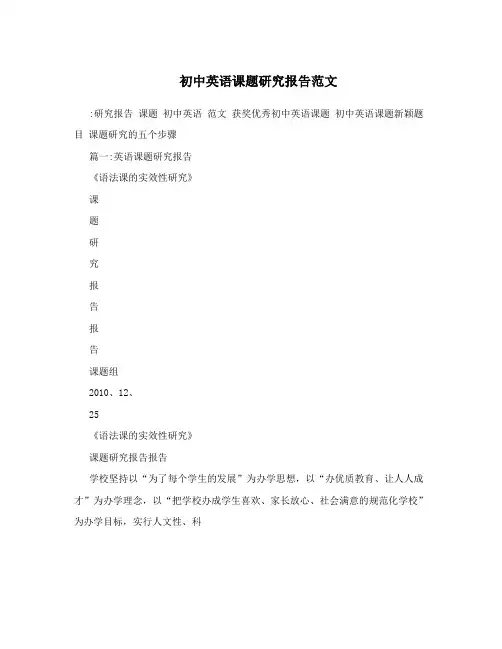
初中英语课题研究报告范文:研究报告课题初中英语范文获奖优秀初中英语课题初中英语课题新颖题目课题研究的五个步骤篇一:英语课题研究报告《语法课的实效性研究》课题研究报告报告课题组2010、12、25《语法课的实效性研究》课题研究报告报告学校坚持以“为了每个学生的发展”为办学思想,以“办优质教育、让人人成才”为办学理念,以“把学校办成学生喜欢、家长放心、社会满意的规范化学校”为办学目标,实行人文性、科学性、规范性、实效性和谐统一的管理模式,全面落实“自主?互助?学习型”课堂,学校拥有多媒体教室、微机室、语音室、理化生实验室等教学设施, 各种仪器2000多件,图书12700册,努力为学生提供最佳的教育学习环境。
一、小结本课题结题的前期准备我校《语法课的实效性》课题作为课题于2009年11月立项。
课题组共有6位主要成员,2009年11月在校内举行了开题仪式,制定了本课题的实施方案,确定了课题的预期目标、研究方法、具体工作进度等详细内容。
目前本实验顺利结束,课题已进入实质性的结题阶段,并已取得了一定实验成果。
所谓“语法课的实效性”是指教师在英语语法教学过程中有意识地、自觉地运用心理学的理论与技术,帮助学生以现行外研版的初中英语教材中语法为主线,融语音、词汇和语法结构以及语言功能、意念和话题为一体的编排语言材料,进而达到诸要素间的有机结合。
该教材的语法项目并非一个个孤单的独立体,而是溶入人物的对话交际中。
新教材的这一特点决定了语法教学必须在交际加语法的过程中实现。
因此,根据新课标的精神,在交际中进行语法教学,提高英语语法的实效性就显得十分实在了。
新课程标准在建议中指出教材不仅要符合学生的知识水平、认知水平和心理发展水平,还要尽可能通过提供趣味性较强的内容和活动,激发学生的学习兴趣和学习动机。
为此,教材应紧密联系学生的实际生活,提供具有时代气息的语言材料,设置尽量真实的语言运用情景,组织具有交际意义的语言实践活动。
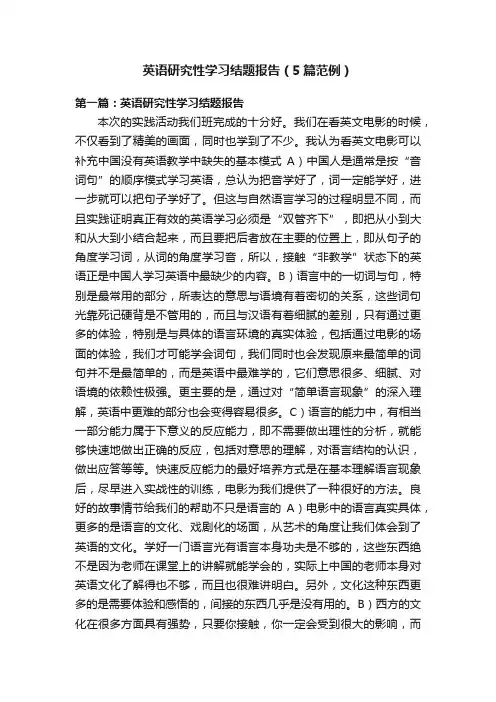
英语研究性学习结题报告(5篇范例)第一篇:英语研究性学习结题报告本次的实践活动我们班完成的十分好。
我们在看英文电影的时候,不仅看到了精美的画面,同时也学到了不少。
我认为看英文电影可以补充中国没有英语教学中缺失的基本模式A)中国人是通常是按“音词句”的顺序模式学习英语,总认为把音学好了,词一定能学好,进一步就可以把句子学好了。
但这与自然语言学习的过程明显不同,而且实践证明真正有效的英语学习必须是“双管齐下”,即把从小到大和从大到小结合起来,而且要把后者放在主要的位置上,即从句子的角度学习词,从词的角度学习音,所以,接触“非教学”状态下的英语正是中国人学习英语中最缺少的内容。
B)语言中的一切词与句,特别是最常用的部分,所表达的意思与语境有着密切的关系,这些词句光靠死记硬背是不管用的,而且与汉语有着细腻的差别,只有通过更多的体验,特别是与具体的语言环境的真实体验,包括通过电影的场面的体验,我们才可能学会词句,我们同时也会发现原来最简单的词句并不是最简单的,而是英语中最难学的,它们意思很多、细腻、对语境的依赖性极强。
更主要的是,通过对“简单语言现象”的深入理解,英语中更难的部分也会变得容易很多。
C)语言的能力中,有相当一部分能力属于下意义的反应能力,即不需要做出理性的分析,就能够快速地做出正确的反应,包括对意思的理解,对语言结构的认识,做出应答等等。
快速反应能力的最好培养方式是在基本理解语言现象后,尽早进入实战性的训练,电影为我们提供了一种很好的方法。
良好的故事情节给我们的帮助不只是语言的A)电影中的语言真实具体,更多的是语言的文化、戏剧化的场面,从艺术的角度让我们体会到了英语的文化。
学好一门语言光有语言本身功夫是不够的,这些东西绝不是因为老师在课堂上的讲解就能学会的,实际上中国的老师本身对英语文化了解得也不够,而且也很难讲明白。
另外,文化这种东西更多的是需要体验和感悟的,间接的东西几乎是没有用的。
B)西方的文化在很多方面具有强势,只要你接触,你一定会受到很大的影响,而这种影响不仅对语言的学习有好处,而且对你的思想、价值观、知识面等等都会有很大的影响。
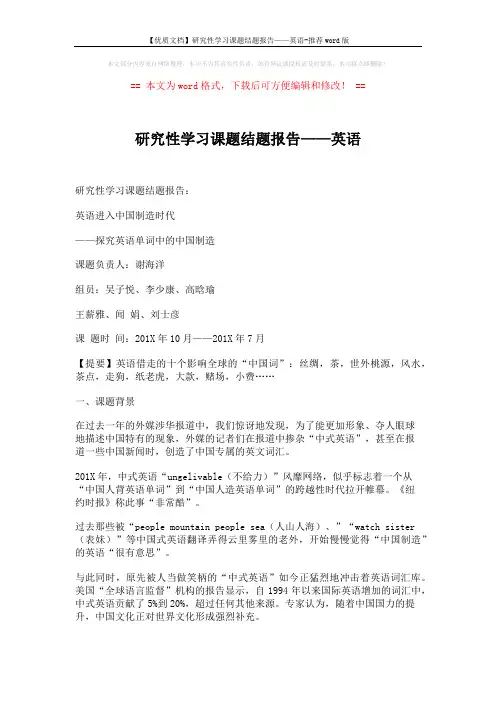
本文部分内容来自网络整理,本司不为其真实性负责,如有异议或侵权请及时联系,本司将立即删除!== 本文为word格式,下载后可方便编辑和修改! ==研究性学习课题结题报告——英语研究性学习课题结题报告:英语进入中国制造时代——探究英语单词中的中国制造课题负责人:谢海洋组员:吴子悦、李少康、高晗瑜王薪雅、闻娟、刘士彦课题时间:201X年10月——201X年7月【提要】英语借走的十个影响全球的“中国词”:丝绸,茶,世外桃源,风水,茶点,走狗,纸老虎,大款,赌场,小费……一、课题背景在过去一年的外媒涉华报道中,我们惊讶地发现,为了能更加形象、夺人眼球地描述中国特有的现象,外媒的记者们在报道中掺杂“中式英语”,甚至在报道一些中国新闻时,创造了中国专属的英文词汇。
201X年,中式英语“ungelivable(不给力)”风靡网络,似乎标志着一个从“中国人背英语单词”到“中国人造英语单词”的跨越性时代拉开帷幕。
《纽约时报》称此事“非常酷”。
过去那些被“people mountain people sea(人山人海)、”“watch sister (表妹)”等中国式英语翻译弄得云里雾里的老外,开始慢慢觉得“中国制造”的英语“很有意思”。
与此同时,原先被人当做笑柄的“中式英语”如今正猛烈地冲击着英语词汇库。
美国“全球语言监督”机构的报告显示,自1994年以来国际英语增加的词汇中,中式英语贡献了5%到20%,超过任何其他来源。
专家认为,随着中国国力的提升,中国文化正对世界文化形成强烈补充。
二、探究目标“中国制造”的标签早已在全球诸多领域掀起过热潮,如今,向来有“国际语言”之称的英语也不免有了“中国制造”的影子。
而伴随对外文化交流的加强,就连外国人也在“耳濡目染”地熏陶中慢慢接受和学习着这些“中国制造”英语。
于是乎,越来越多的人开始关注中国式英语,人们不禁要问:在因错误而生的幽默背后,中国式英语的前路又将会延伸到何方?有留学生在看到商场门框上提示“小心碰头”的标牌上翻译为“Becarefultohityourhead(小心地去碰你的头)”时不禁捧腹大笑。
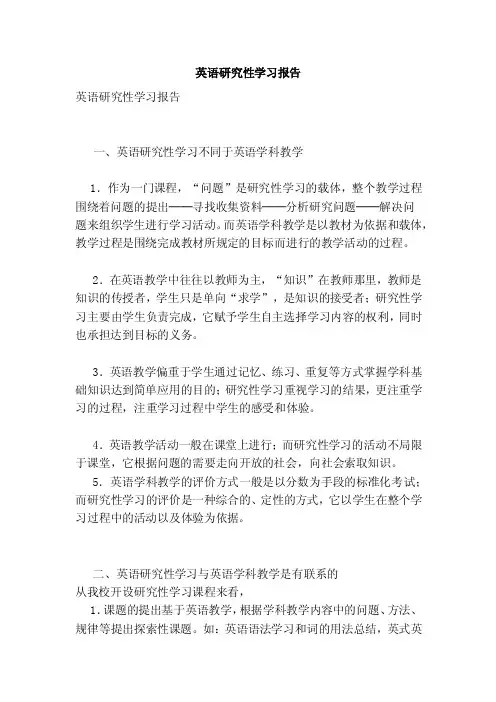
英语研究性学习报告英语研究性学习报告一、英语研究性学习不同于英语学科教学1.作为一门课程,“问题”是研究性学习的载体,整个教学过程围绕着问题的提出──寻找收集资料──分析研究问题──解决问题来组织学生进行学习活动。
而英语学科教学是以教材为依据和载体,教学过程是围绕完成教材所规定的目标而进行的教学活动的过程。
2.在英语教学中往往以教师为主,“知识”在教师那里,教师是知识的传授者,学生只是单向“求学”,是知识的接受者;研究性学习主要由学生负责完成,它赋予学生自主选择学习内容的权利,同时也承担达到目标的义务。
3.英语教学偏重于学生通过记忆、练习、重复等方式掌握学科基础知识达到简单应用的目的;研究性学习重视学习的结果,更注重学习的过程,注重学习过程中学生的感受和体验。
4.英语教学活动一般在课堂上进行;而研究性学习的活动不局限于课堂,它根据问题的需要走向开放的社会,向社会索取知识。
5.英语学科教学的评价方式一般是以分数为手段的标准化考试;而研究性学习的评价是一种综合的、定性的方式,它以学生在整个学习过程中的活动以及体验为依据。
二、英语研究性学习与英语学科教学是有联系的从我校开设研究性学习课程来看,1.课题的提出基于英语教学,根据学科教学内容中的问题、方法、规律等提出探索性课题。
如:英语语法学习和词的用法总结,英式英语与美式英语的不同,英语学习方法的研究以及从教学内容延伸出的课题等。
2.在收集资料过程中,学生必然会运用已学英语知识查阅因特网上、图书馆中的大量英语材料;运用英语与外籍人士交流,对他们进行调查访问。
3.学生运用已学的英语知识完成部分课题的结题报告。
4.在答辩过程中,课题组学生得运用英语来对教师提出的问题进行阐述。
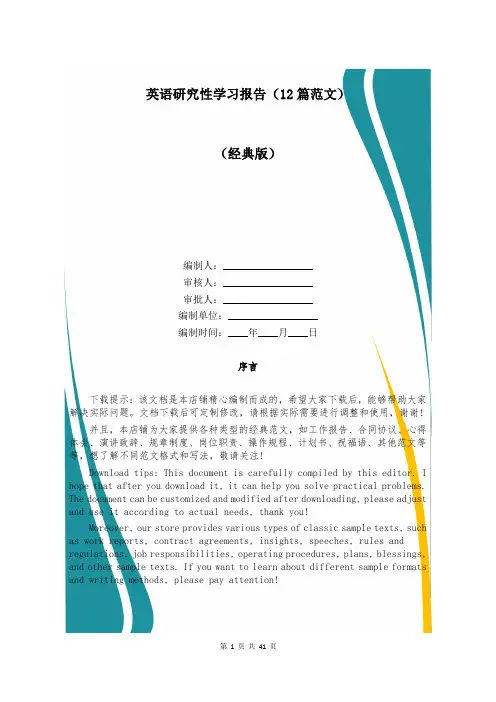
英语研究性学习报告(12篇范文)(经典版)编制人:__________________审核人:__________________审批人:__________________编制单位:__________________编制时间:____年____月____日序言下载提示:该文档是本店铺精心编制而成的,希望大家下载后,能够帮助大家解决实际问题。
文档下载后可定制修改,请根据实际需要进行调整和使用,谢谢!并且,本店铺为大家提供各种类型的经典范文,如工作报告、合同协议、心得体会、演讲致辞、规章制度、岗位职责、操作规程、计划书、祝福语、其他范文等等,想了解不同范文格式和写法,敬请关注!Download tips: This document is carefully compiled by this editor. I hope that after you download it, it can help you solve practical problems. The document can be customized and modified after downloading, please adjust and use it according to actual needs, thank you!Moreover, our store provides various types of classic sample texts, such as work reports, contract agreements, insights, speeches, rules and regulations, job responsibilities, operating procedures, plans, blessings, and other sample texts. If you want to learn about different sample formats and writing methods, please pay attention!英语研究性学习报告(12篇范文)【第1篇】英语研究性学习报告一、英语研究性学习不同于英语学科教学1.作为一门课程,“问题”是研究性学习的载体,整个教学过程围绕着问题的提出──寻找收集资料──分析研究问题──解决问题来组织学生进行学习活动。
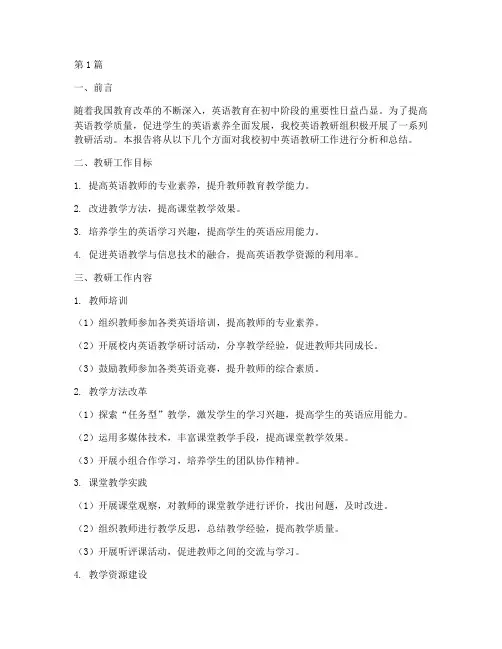
第1篇一、前言随着我国教育改革的不断深入,英语教育在初中阶段的重要性日益凸显。
为了提高英语教学质量,促进学生的英语素养全面发展,我校英语教研组积极开展了一系列教研活动。
本报告将从以下几个方面对我校初中英语教研工作进行分析和总结。
二、教研工作目标1. 提高英语教师的专业素养,提升教师教育教学能力。
2. 改进教学方法,提高课堂教学效果。
3. 培养学生的英语学习兴趣,提高学生的英语应用能力。
4. 促进英语教学与信息技术的融合,提高英语教学资源的利用率。
三、教研工作内容1. 教师培训(1)组织教师参加各类英语培训,提高教师的专业素养。
(2)开展校内英语教学研讨活动,分享教学经验,促进教师共同成长。
(3)鼓励教师参加各类英语竞赛,提升教师的综合素质。
2. 教学方法改革(1)探索“任务型”教学,激发学生的学习兴趣,提高学生的英语应用能力。
(2)运用多媒体技术,丰富课堂教学手段,提高课堂教学效果。
(3)开展小组合作学习,培养学生的团队协作精神。
3. 课堂教学实践(1)开展课堂观察,对教师的课堂教学进行评价,找出问题,及时改进。
(2)组织教师进行教学反思,总结教学经验,提高教学质量。
(3)开展听评课活动,促进教师之间的交流与学习。
4. 教学资源建设(1)收集整理英语教学资源,为教师提供丰富的教学素材。
(2)建立英语教学资源库,提高教学资源的利用率。
(3)鼓励教师开发校本课程,满足学生的个性化需求。
四、教研工作成果1. 教师的专业素养得到提升,教育教学能力不断提高。
2. 课堂教学效果明显改善,学生的学习兴趣和英语应用能力得到提高。
3. 学生在各类英语竞赛中取得优异成绩,学校英语教育品牌得到提升。
4. 教学资源建设取得丰硕成果,为英语教学提供了有力保障。
五、存在问题及改进措施1. 部分教师对英语教学改革的认识不足,教学观念滞后。
改进措施:加强教师培训,提高教师对英语教学改革的认识,更新教学观念。
2. 教学资源不足,影响英语教学效果。
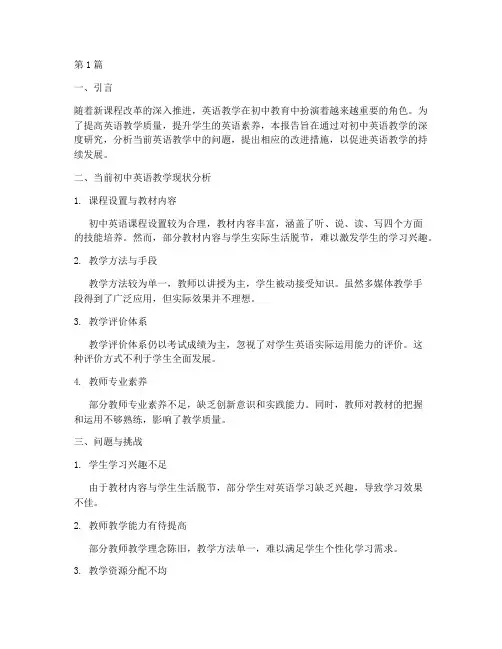
第1篇一、引言随着新课程改革的深入推进,英语教学在初中教育中扮演着越来越重要的角色。
为了提高英语教学质量,提升学生的英语素养,本报告旨在通过对初中英语教学的深度研究,分析当前英语教学中的问题,提出相应的改进措施,以促进英语教学的持续发展。
二、当前初中英语教学现状分析1. 课程设置与教材内容初中英语课程设置较为合理,教材内容丰富,涵盖了听、说、读、写四个方面的技能培养。
然而,部分教材内容与学生实际生活脱节,难以激发学生的学习兴趣。
2. 教学方法与手段教学方法较为单一,教师以讲授为主,学生被动接受知识。
虽然多媒体教学手段得到了广泛应用,但实际效果并不理想。
3. 教学评价体系教学评价体系仍以考试成绩为主,忽视了对学生英语实际运用能力的评价。
这种评价方式不利于学生全面发展。
4. 教师专业素养部分教师专业素养不足,缺乏创新意识和实践能力。
同时,教师对教材的把握和运用不够熟练,影响了教学质量。
三、问题与挑战1. 学生学习兴趣不足由于教材内容与学生生活脱节,部分学生对英语学习缺乏兴趣,导致学习效果不佳。
2. 教师教学能力有待提高部分教师教学理念陈旧,教学方法单一,难以满足学生个性化学习需求。
3. 教学资源分配不均城乡学校之间、不同班级之间教学资源分配不均,影响了教学质量的提高。
4. 家庭教育与学校教育脱节部分家长对英语学习重视不够,导致家庭教育与学校教育脱节,影响了学生的学习效果。
四、改进措施1. 优化课程设置与教材内容根据学生实际需求,优化课程设置,增加与生活相关的教学内容,提高学生的学习兴趣。
2. 创新教学方法与手段采用多样化的教学方法,如任务型教学、合作学习等,激发学生的学习兴趣,提高教学效果。
3. 完善教学评价体系建立多元化的评价体系,注重对学生英语实际运用能力的评价,促进学生的全面发展。
4. 提高教师专业素养加强教师培训,提高教师的专业素养和教学能力,为提高教学质量奠定基础。
5. 优化教学资源配置合理分配教学资源,缩小城乡学校之间、不同班级之间的差距,促进教育公平。
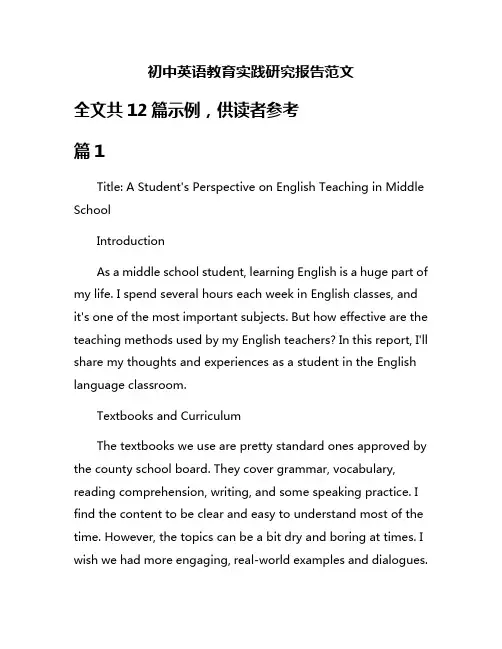
初中英语教育实践研究报告范文全文共12篇示例,供读者参考篇1Title: A Student's Perspective on English Teaching in Middle SchoolIntroductionAs a middle school student, learning English is a huge part of my life. I spend several hours each week in English classes, and it's one of the most important subjects. But how effective are the teaching methods used by my English teachers? In this report, I'll share my thoughts and experiences as a student in the English language classroom.Textbooks and CurriculumThe textbooks we use are pretty standard ones approved by the county school board. They cover grammar, vocabulary, reading comprehension, writing, and some speaking practice. I find the content to be clear and easy to understand most of the time. However, the topics can be a bit dry and boring at times. I wish we had more engaging, real-world examples and dialogues.The curriculum moves at a good pace, introducing new concepts systematically. We build on what we learned previously. What I don't like is the heavy emphasis on preparing for standardized tests. It feels like we spend too much class time on strategies for test-taking rather than actually using and practicing English in meaningful ways.Teaching MethodsMost of my English teachers use a combination of lectures, going over textbook exercises as a class, and giving us homework assignments and quizzes. Occasionally we watch videos or have group activities, but lectures are definitely the main method.I have to admit, the lectures can be really dry and hard to pay attention to, especially after we've already been sitting through hours of other classes that day. The teachers try to make them interactive by asking us questions, but we don't get much opportunity for open discussion or debates.When we do pair or group work, I find it very helpful to practice conversing in English with my classmates. Roleplaying, discussions, and projects are the times when I feel I'm really using and reinforcing what I've learned.Learning EnvironmentThe classroom setup is pretty traditional - rows of desks or tables facing the board and teacher's desk. We sometimesre-arrange the furniture for group work, but not very often. The rooms are reasonably well-equipped with projectors, audio equipment, and decent lighting and temperature control.What I don't like is the lack of opportunities to practice English outside of class time. There aren't any English clubs, immersion events, or partnerships with English speakers in the community. It would be great to have more ways to apply my English skills in real-world environments.Assessment MethodsStudents are primarily assessed through tests, quizzes, homework assignments and classroom participation. We have unit tests for each textbook chapter as well as midterm and final exams. A lot of weight is put on the scores from these standardized tests.While the tests check our grammar, vocabulary and reading abilities, I don't feel they adequately measure our speaking and real-world communication skills. I wish we had moreopportunities for open-ended assignments, presentations, and projects that could demonstrate our overall English proficiency.RecommendationsBased on my experiences as a student, here are some recommendations for improving English teaching in middle schools:Update curriculum with more relevant, engaging topics and materials that show real-world applications of English. This could include podcasts, news articles, video clips and other authentic resources.Allocate more class time for interactive activities like discussions, debates, presentations and projects where students can practice actively using English in spontaneous situations.Offer extracurricular options like English clubs, immersion activities with native speakers, or partnerships with local companies/organizations that use English for students to apply their skills.Revise assessment methods to include more performance-based components like oral exams, presentations and portfolio assignments in addition to traditional tests/quizzes.This will incentivize developing well-rounded communication abilities.Provide teacher training on effective strategies for English language instruction such as task-based learning, communicative approaches and incorporating more technology/multimedia into lessons.ConclusionWhile the foundations of English education in my middle school are solid, I believe there are areas that could be improved to make it a more engaging, productive and practical experience. With some updates to the curriculum, more interactive teaching methods, an enhanced learning environment and revised assessment approaches, we could become more confident and capable English communicators ready for the real world.篇2My English Learning Journey in Middle SchoolIntroductionAs an 8th grader about to graduate from middle school, I've spent the last three years immersed in learning English. Looking back, I've come a long way from those first few classes! English isa core subject here, and my school puts a big emphasis on helping us build solid language skills. In this report, I'll share my experiences, what worked well, what was challenging, and my thoughts on English education in middle schools.My Background and Early ClassesI started learning English basics in elementary school, but everything ramped up when I began 6th grade. At first, the pace and intensity felt overwhelming. We had English class every day, often with separate periods for reading, writing,speaking/listening, and grammar instruction. The vocabulary lists and grammar rules seemed never-ending!Those early classes focused heavily on building our foundational knowledge. We spent a lot of time memorizing vocabulary word lists organized by topic. We also did tons of drill exercises, diagramming sentences, and learning about verb tenses, parts of speech, and the other nitty-gritty grammar details. While tedious at times, I realized later how crucial it was to cement those basics.Engaging Activities That HelpedWhat stands out most in my mind from 6th grade English classes were the engaging activities that broke up the routine.Our teacher was big on games, songs, chants, and other interactive elements to reinforce what we were learning. Vocabulary games like Pictionary, bingo, charades andround-robin word defining were fun ways to solidify word meanings in our minds.For grammar practice, we'd do activities like grammar auctions (bidding on correct sentence examples), grammar rap battles, and team competitions around identifying parts of speech or sentence types. I especially loved the singing and chanting, which made verb conjugations and grammar rules stick through repetition and melody.Appreciating Reading and WritingAs we progressed into 7th and 8th grade, the curriculum expanded from the foundational skills to higher-level reading comprehension, writing, speaking, and analytical skills. We started exploring different genres of literature, from short stories and novels to poetry, plays, and nonfiction articles.At first, I found analyzing literature pretty dry and tedious. However, once I got the hang of strategies like finding the main idea, making inferences, identifying themes and character motivations, I started appreciating literature on a deeper level.Discussions helped bring the texts to life as we shared perspectives and drew out richer meanings.On the writing side, we followed the full process from brainstorming to drafting, revising, editing, and publishing. We learned about different formats like narratives, persuasive essays, research reports, and more. My writing definitely improved through rounds of feedback and having models to emulate. However, I still find citing evidence and developing a smooth logical flow challenging.Conquering the Fear of SpeakingMy biggest struggle has been with the speaking and listening components of English class. As a naturally shy person, I've had to work hard to overcome my fear of public speaking and conversational mistakes. Fortunately, my teachers created a supportive environment with lots of opportunities for lowstakes practice.We did activities like simulated conversations, role plays, debates, presentations, and group projects with an emphasis on speaking up. While nerve-wracking at first, the more I practiced, the more confidence I gained. A breakthrough moment was giving my first big research presentation in 8th grade. While farfrom perfect, getting through it felt like a huge weight off my shoulders.Measuring Progress and Areas for ImprovementBetween regular testing, quizzes, and standardized English exams each year, we got plenty of feedback on our progress across reading, writing, speaking, and listening skills. Overall, my scores put me at or above the expected levels for my grade. However, there's still plenty of room for improvement as I look ahead to high school English classes.My teachers have emphasized areas like expanding my academic vocabulary, varying my sentence structures for better flow, and backing up claims with stronger textual evidence in my writing. For speaking, I need to focus on minimizing filler words, thinking through responses, and projecting more confidence. With listening, I occasionally still struggle to catch every word, especially with unfamiliar accents.Looking AheadEnglish will continue being a major part of my studies throughout high school and beyond. While the journey has felt challenging at times, I'm grateful for how much my skills have grown over these past three years of middle school. Theinteractive activities, opportunities for practice and feedback, and supportive teachers have all played an important part.As I look ahead, I know I'll need to stay dedicated to expanding my vocabulary, perfecting my grammar, reading a variety of complex texts, and honing my communication abilities. English fluency will open up many opportunities for me, from academics to career paths. With continued hard work and the right learning approach, I'm confident I can achieve the level of English mastery I'll need for future success.篇3Title: Learning English in Middle School - A Kid's ViewIntroductionHi there! My name is Jenny and I'm a 5th grader at Oakwood Elementary School. I love learning new things, especially about different languages and cultures. This year, I did a research project all about how English is taught in middle schools. I interviewed teachers, observed some classes, and looked at textbooks and lesson plans. I thought it would be really cool to share what I learned with you!How English is TaughtIn the middle schools I looked at, English class happens almost every day for around 50 minutes. The classes have between 20-30 students of different English levels. From what I saw, teachers use a mix of techniques like:Vocabulary Lists - Students get lists of new vocab words to learn meanings, pronunciation, etc. The words are often connected to the unit theme.Reading Passages - There are longer texts that explore different topics. Students read and answer comprehension questions.Grammar Study - Covering English grammar rules for things like verb tenses, sentence structure, etc. Lots of practice exercises.Speaking Activities - Pair and group conversational activities let students practice speaking skills.Writing Assignments - Short paragraphs and essays allowing practice of writing skills.Multimedia - Using videos, online exercises, language apps to engage students differently.Projects - Longer assignments like presenting, making videos/posters to apply skills.Depending on the school, they either have one English teacher or sometimes switch between teachers for different units/skills.Popular Textbooks and MaterialsThe most widely used textbook series I saw was published by Oxford University Press called "Incredible English." It comes with texts, workbooks, multimedia resources, and teacher's manuals. Another popular one was "Top Notch" from Pearson publishers.Schools seemed to supplement the main textbooks with lots of other materials too. Things like reading libraries with novels, short stories, newspapers, and magazines. Or online exercise websites and language learning apps. Some used videos from YouTube channels like "English Class V.O.A. Learning English" or "BBC Learning English."Many classrooms had educational posters and games related to vocabulary, grammar, reading strategies, etc. Teachers get pretty creative finding engaging resources to use!Challenges of Learning EnglishFrom talking to students, some of the biggest challenges seem to be:Pronunciation - Speaking clearly with proper pronunciation of certain English sounds.Vocabulary - Learning and retaining all the new vocabulary words.Grammar - Understanding and applying all the grammar rules correctly.Speaking Confidence - Feeling shy or nervous to speak out and practice conversational skills.Listening Comprehension - Understanding Englishaudio/video sources can be difficult.Different students struggle more with certain aspects based on their personal learning styles and strengths. Consistent practice seems to be key for improving overall.What I Think About ItIn my opinion, learning English seems both really fun and really challenging at the same school level. I can see how the variety of activities like reading, writing, speaking, listening would allow students to practice using English in different ways. The multimedia and group/pair work also looks engaging.However, I imagine having to learn all those grammar rules plus tons of new vocabulary would feel overwhelming at times. Speaking out and doing presentations also seems prettynerve-wracking, especially in front of others. I'm already a bit nervous about English classes in middle school!I think the teachers have a tough job making classes interesting while covering so much material. But it seems like most try to balance textbook work with other interactive resources. Keeping students motivated and providing enough practice opportunities is probably difficult.Overall though, middle school seems like a great time to build solid English foundations. The lessons look designed to develop well-rounded skills in all areas through diverse techniques. As challenging as it might be, developing abilities at that age will definitely pay off down the road.ConclusionWell, that's my kid's perspective on how English is commonly taught in middle schools! I had a blast researching this topic and getting a preview of what's to come. While it won't be easy, I'm really looking forward to continuing my English studies soon. Being bilingual opens up so many opportunities.I hope you found my observations interesting and insightful. Learning a new language allows connecting to different cultures and viewpoints. It's such a valuable lifelong skill. I'm grateful my school district makes English education a priority starting at the middle level. Maybe I'll be an English teacher someday too!篇4My Big Brother's Important English ExamMy big brother Xiao Ming just took a really important English exam called the Anqing High School Senior Year Mock Exam. It was a big deal because it helps get ready for the even bigger gaokao exam that all students have to take to get into university in China. Xiao Ming has been studying so hard for months!When he got his score back, he was pretty happy but also a little disappointed. He got a 78 out of 100 on the English portion. That's a pretty good score, but Xiao Ming was hoping for higher since English is one of his best subjects usually.My parents have different opinions about the score. My mom thinks 78 is excellent and she's proud of Xiao Ming for working so hard. She says the mock exam is just practice and the real gaokao test is what matters most. My dad though, he wantsXiao Ming to keep pushing himself to get an even higher score. Dad thinks if he gets into a prestigious university, it will lead to a good stable job and better life for our family in the future.I don't fully understand what the big deal is, since I'm just a little kid in elementary school. But I know it's very important for growing up and becoming an adult in China. I'll be taking that gaokao test myself in just a few years!Xiao Ming has been going over his exam very carefully to learn from his mistakes. He showed me the different sections. There was listening, reading, grammar, writing and translation. He told me the writing section, where you have to write an essay in English, is one of the hardest parts.For the listening, you have to listen to recordings of English speakers and answer questions. Xiao Ming said his English listening skills are pretty good from watching movies and shows, but there were still some tough sections where the speakers talked really fast or used slang he wasn't familiar with.The reading section had long passages to read and answer questions about. Xiao Ming struggled with some of the super long vocabulary words and idioms he hadn't seen before. He told me you have to have a really large English vocabulary to do well on that part.The grammar questions were mostly about verb tenses, parts of speech, clauses and other grammar rules. Xiao Ming has learned English grammar for many years so that was one of his stronger sections, though he said even native English speakers sometimes struggle with all the crazy grammar rules and exceptions.Then for writing the essay, you have to write a longer structured piece, usually an expository or argumentative essay. You're graded on your ideas, organization, grammar, vocabulary and more. Xiao Ming finds it pretty difficult to write a long coherent piece with few mistakes, especially under timed pressure of the exam.The final translation section asked students to translate sentences and short paragraphs between English and Chinese. Xiao Ming said this was pretty hard because you really need to understand the deeper meaning and conventions in both languages to translate accurately.Overall, Xiao Ming was okay with his 78 score, but he's realizing he needs to work even harder now to get an even higher score on the real gaokao exam. He's going to study English vocabulary using flashcards, read more books andarticles to improve reading comprehension, practice listening to TV shows and podcasts, and do lots of timed writing practice.I tried to give Xiao Ming a pep talk to cheer him up. I told him I think he's amazing at English already and so smart! He works incredibly hard, way harder than me. I said a 78 is still a really good score and he should be proud. I know Xiao Ming is doubling down to get a 90+ on the real test, but I reminded him that his score doesn't define who he is. As long as he tries his best, that's what matters most.I look up to Xiao Ming so much. Seeing how intensely he prepares for these huge exams makes me realize I'll need to work that hard too when I'm in high school. For now though, I just focus on the math tests in my 3rd grade class! I'm rooting for Xiao Ming to ace the gaokao. I have no doubt he'll make our family proud, no matter what score he gets. Xiao Ming, jiayou!篇5初中英语教育实践研究报告引言大家好!我是一名小学生,我今天想和大家分享一下我对初中英语教育的实践研究。
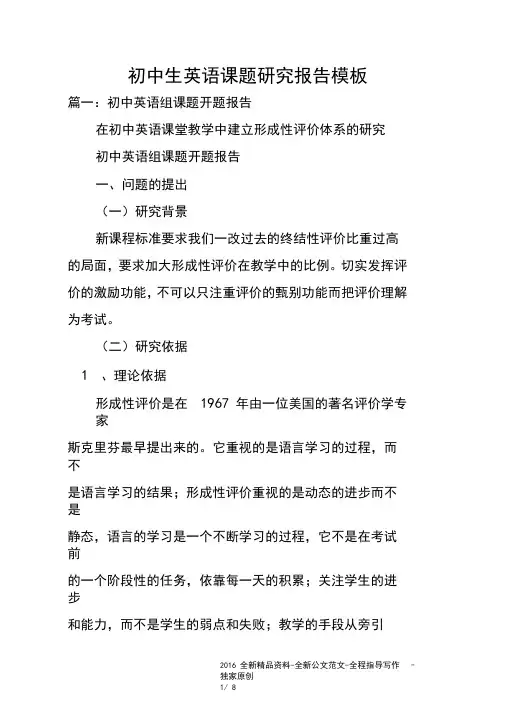
初中生英语课题研究报告模板篇一:初中英语组课题开题报告在初中英语课堂教学中建立形成性评价体系的研究初中英语组课题开题报告一、问题的提出(一)研究背景新课程标准要求我们一改过去的终结性评价比重过高的局面,要求加大形成性评价在教学中的比例。
切实发挥评价的激励功能,不可以只注重评价的甄别功能而把评价理解为考试。
(二)研究依据1、理论依据形成性评价是在1967 年由一位美国的著名评价学专家斯克里芬最早提出来的。
它重视的是语言学习的过程,而不是语言学习的结果;形成性评价重视的是动态的进步而不是静态,语言的学习是一个不断学习的过程,它不是在考试前的一个阶段性的任务,依靠每一天的积累;关注学生的进步和能力,而不是学生的弱点和失败;教学的手段从旁引导,启发学生思维,引导学生进行自主的学习。
让学生作为教学活动的中心,在教师的引导下进行多样的活动,在此过程中培养积极竞争的课堂气氛,加强学生的主动性,同时增进学生之间的合作默契。
形成性评价是对学生学习过程中使用所学知识进行学习活动的情况的评价, 旨在确认学生的学习潜力, 发展学生的学习能力。
形成性评价不仅注重对学生认知能力的评价, 而且也重视对学生行为能力的评价, 为学生提供一个不断自我完善和提高的机会。
核心是让学生自主地完成某些学习任务, 在学习过程中体验成功与收获, 有利于培养学生的学习兴趣, 增强其学习的动机和学习的自信心。
总的来说, 形成性评价具有主体性、多元性、开放性的特点。
2、现实依据在初中英语课堂教学中,教师对学生听、说、读、写四项语言技能的评价,并不是只根据考试成绩来衡量学生,注重学习结果的终结性评价。
如何在初中英语课堂教学中(三)研究目的和意义英语教师对每个学生英语学习情况的评价,不只是通过传统的考试或听写成绩来考查。
而是注重在培养学生外语知识的运用能力, 即学生学习英语的听、说、读、写等各项技能的过程中, 注重过程、动态的形成性评价,体现教师在英语课堂教学评价方式上的多元性、多样性。
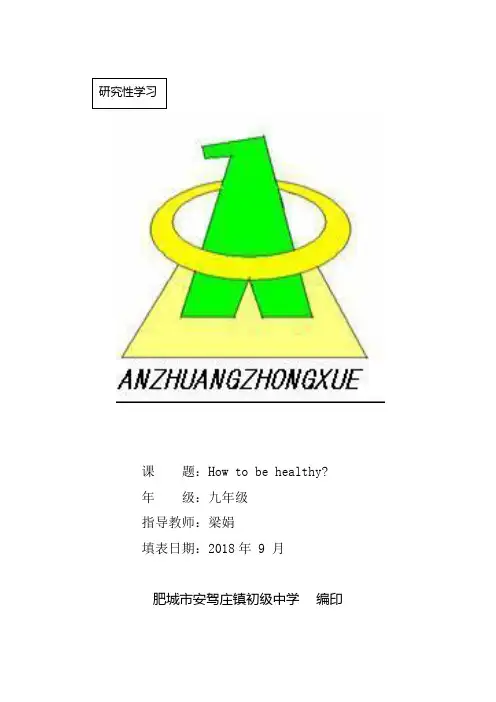
研究性学习课题:How to be healthy?年级:九年级指导教师:梁娟填表日期:2018年 9 月肥城市安驾庄镇初级中学编印目录研究性学习课题组指导意见 (1)表一、指导教师信息表 (4)表二、研究性课题申报表 (5)表三、开题报告 (6)表四、开题研究记录 (7)表五、研究活动记录表(一) (9)表六、研究活动记录表(二) (10)表七、研究活动记录表(三) (11)表八、研究活动记录表(四) (12)表九、研究中期报告与交流 (13)表十、调查报告 (14)表十一、研究结题报告 (16)表十二、结题答辩与鉴定书 (18)表十三、《研究性学习评价表》 (19)表十四、附活动材料 (20)安庄中学研究性学习课题组指导意见研究性学习是国家规定的必修课程,是教育部颁布的《课程方案》中确定的八个学习领域之一——综合实践活动课程的重要组成部分。
通过研究性学习,学生要获得亲身参与研究、探索的体验,培养发现问题和解决问题的能力培养收集、分析和利用信息的能力学会分享与合作,培养科学态度和科学道德培养对社会的责任心和使命感。
一、学生课题组组长的职责和要求学生课题组组长在研究性学习课程实施过程中,主要负责团结全组同学并带领大家积极投入每个阶段的学习活动,完成各阶段的工作目标和任务。
一般由学生推举产生;以身作则,尊重组员,虚心听取各方面的意见,要有研究成本意识,做好协调工作,处理同学之间出现的矛盾和分歧,对小组课题研究计划的实施和组员的管理负有责任。
1、在教师的指导下,带领全组制订课题研究方案,撰写开题报告,开展课题研究,完成结题报告和小组总结,参加年级统一组织的开题评审、成果展示、答辩、考核等活动。
2、在教师的指导下,负责课题小组成员的分工,根据组成员的特长和兴趣爱好,合理有效地进行人员配置,明确本组人员各自的责任,要求大家认真履行,对不能完成任务的组员及时进行批评、督促。
3、每两周定期组织召开一次课题组会议,讨论课题研究中遇到的问题,商量解决的办法,反思前面的工作,确定活动容和方式。
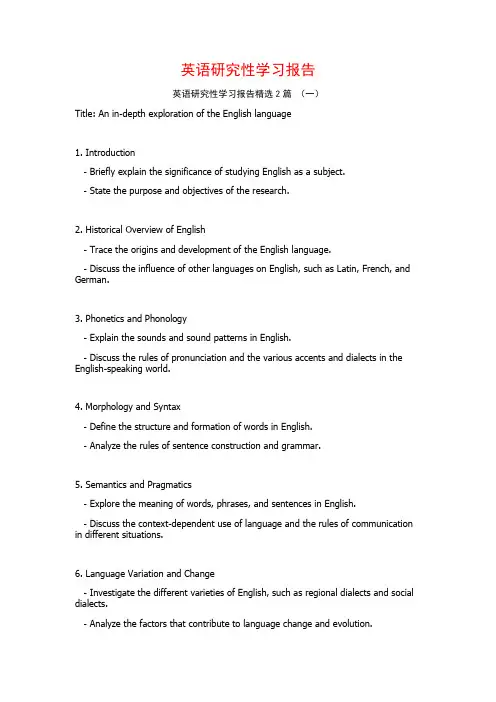
英语研究性学习报告英语研究性学习报告精选2篇(一)Title: An in-depth exploration of the English language1. Introduction- Briefly explain the significance of studying English as a subject.- State the purpose and objectives of the research.2. Historical Overview of English- Trace the origins and development of the English language.- Discuss the influence of other languages on English, such as Latin, French, and German.3. Phonetics and Phonology- Explain the sounds and sound patterns in English.- Discuss the rules of pronunciation and the various accents and dialects in the English-speaking world.4. Morphology and Syntax- Define the structure and formation of words in English.- Analyze the rules of sentence construction and grammar.5. Semantics and Pragmatics- Explore the meaning of words, phrases, and sentences in English.- Discuss the context-dependent use of language and the rules of communication in different situations.6. Language Variation and Change- Investigate the different varieties of English, such as regional dialects and social dialects.- Analyze the factors that contribute to language change and evolution.7. Language Acquisition- Examine the process of acquiring English as a second language.- Discuss theories of language acquisition and the role of linguistics in language teaching.8. Sociolinguistics- Explore the relationship between language and society.- Discuss language attitudes, social identity, and language policy.9. English as a Global Language- Examine the spread and dominance of English worldwide.- Discuss the implications of English as a lingua franca and the challenges of multilingualism.10. Conclusion- Summarize the key findings and insights from the research.- Reflect on the importance of studying English and its impact on individuals and society.11. References- List all the sources used in the research, following the appropriate citation style.Note: This outline provides a general structure for a research report on the study of the English language. It is important to tailor the content and subtopics according to the specific requirements and focus of your research.英语研究性学习报告精选2篇(二)Title: Observational Report on English Training SessionIntroduction:This report provides an overview of a recent English training session that I observed as part of my professional development. I attended the session at ABC LanguageCenter on [date], which focused on improving the speaking and listening skills of intermediate-level learners.Session Observations:1. Lesson Content: The trainer started the session by introducing the topic of travel and presenting relevant vocabulary and phrases. The lesson was structured in a way that allowed for both individual and group activities. The trainer incorporated various exercises, such as role-plays, discussions, and listening comprehension tasks, to engage the learners.2. Lesson Delivery: The trainer used a communicative approach, encouraging the learners to actively participate and use the language in authentic contexts. They created a supportive and inclusive atmosphere, ensuring that each learner had the opportunity to contribute. The trainer used a variety of teaching techniques, including visual aids, real-life examples, and multimedia resources, to cater to different learning styles.3. Learner Engagement: The learners were actively engaged throughout the session, demonstrating a high level of motivation and participation. They were encouraged to work in pairs and small groups, which fostered collaboration and peer interaction. The trainer effectively monitored the learners' progress and provided timely feedback to enhance their understanding and language use.4. Classroom Management: The trainer demonstrated excellent classroom management skills by establishing clear expectations and rules from the beginning. They guided the learners' behavior with positive reinforcement and established a respectful and inclusive learning environment. The learners felt comfortable asking questions and making mistakes, creating a supportive atmosphere for growth and development.Strengths:- Clear and concise explanation of language concepts.- Effective incorporation of various activities to promote skill development.- Engaging and interactive teaching style.- Inclusive and respectful classroom environment.Improvement Areas:- Providing more opportunities for learners to practice speaking individually.- Incorporating more form-focused activities to reinforce grammar and pronunciation.Conclusion:Overall, I found the English training session at ABC Language Center to be an effective and engaging learning experience. The trainer's communicative approach, coupled with their excellent classroom management, created a positive learning environment. The session successfully enhanced the learners' speaking and listening skills, and I gained valuable insights on effective teaching techniques that I can apply in my own practice.。
佛山市第三中学英语研究性学习实践报告1.研究性学习的实施背景随着时代的发展、经济的进步,社会需要新型的有创新能力的人才。
因此,国家进一步强调了素质教育的重要性。
研究性学习正是在这种时代背景下出现的一种新课程。
为了适应社会的需要,教育部2001年5月发布了关于在中小学开设研究性课程的决定,要求全面推进素质教育,培养具有主动发展和终生学习能力,能适应未来时代要求的新人。
决定颁布后,不少中学开始了研究性学习的课程设置。
2.研究性学习的理论依据2.1.研究性学习的定义从广义理解,研究性学习泛指学生主动探究的学习活动。
它是一种学习的理念、策略、方法,适用于学生对所有学科的学习。
从狭义看,作为一门独立的课程,研究性学习指在教学过程中以问题为载体,创设一种类似科学研究的情境和途径,让学生通过自己收集、分析和处理信息来实际感受和体验知识的生产过程,进而了解社会,学会学习,培养分析问题、解决问题的能力和创造能力。
2.2.研究性学习的特征研究性学习作为一种全新的教学方式和学习方式,它与传统的授受式教学和维持性学习相比较,它具有探索性、自主性、创新性、合作性等突出特征。
1)探索性----探索是人类认识自然社会的基本方式,研究性学习的探索性与人类的认知方式相一致。
其探索性表现在研究的课题是非预定的、未知的,结论的获取也不是由教师简单传授或从书本上直接得到,而是学生查资料、做实验,通过假设求证,最终解决问题来得出的。
这种探索不是严格意义的科学探索,而是一种模拟探索,它不规范严谨,只是科学研究的思维方式、研究方法和研究过程在学生学习活动中的具体运用。
它让学生有一种探索的体验。
2)自主性---- 研究性学习的整个过程,是一个学生充分发展自己的主体能动性,自主地、独立地、创造性的学习过程。
在这一过程中,学生从选题到制定计划,到收集资料,到最后的成果呈现,都渗透着他们创造性劳动和积极的创新思考。
研究性学习以自主性为自己的本质性特征,反对把现成答案交给学生,反对代替学生去研究。
英语研究性学习报告范文篇一:英语研究性学习报告英语研究性学习报告一、英语研究性学习不同于英语学科教学1.作为一门课程,“问题”是研究性学习的载体,整个教学过程围绕着问题的提出──寻找收集资料──分析研究问题──解决问题来组织学生进行学习活动。
而英语学科教学是以教材为依据和载体,教学过程是围绕完成教材所规定的目标而进行的教学活动的过程。
2.在英语教学中往往以教师为主,“知识”在教师那里,教师是知识的传授者,学生只是单向“求学”,是知识的接受者;研究性学习主要由学生负责完成,它赋予学生自主选择学习内容的权利,同时也承担达到目标的义务。
3.英语教学偏重于学生通过记忆、练习、重复等方式掌握学科基础知识达到简单应用的目的;研究性学习重视学习的结果,更注重学习的过程,注重学习过程中学生的感受和体验。
4.英语教学活动一般在课堂上进行;而研究性学习的活动不局限于课堂,它根据问题的需要走向开放的社会,向社会索取知识。
5.英语学科教学的评价方式一般是以分数为手段的标准化考试;而研究性学习的评价是一种综合的、定性的方式,它以学生在整个学习过程中的活动以及体验为依据。
二、英语研究性学习与英语学科教学是有联系的从我校开设研究性学习课程来看,1.课题的提出基于英语教学,根据学科教学内容中的问题、方法、规律等提出探索性课题。
如:英语语法学习和词的用法总结,英式英语与美式英语的不同,英语学习方法的研究以及从教学内容延伸出的课题等。
2.在收集资料过程中,学生必然会运用已学英语知识查阅因特网上、图书馆中的大量英语材料;运用英语与外籍人士交流,对他们进行调查访问。
3.学生运用已学的英语知识完成部分课题的结题报告。
4.在答辩过程中,课题组学生得运用英语来对教师提出的问题进行阐述。
三、如何进行英语研究性学习英语研究性学习课题的实施计划1.课题:(1)中西方餐饮文化的异同(2)美式与英式英语的不同(3)英语学习方法的研究(4)东西方身体语言的异同(5)讲英语国家的概况(美国、英国、澳大利亚、新西兰等)(6)汉英句子结构的异同(7)语法的学习和词语的用法总结(8)英语在实际生活中的应用2.目标:(1)增进学生对西方国家政治、历史、人文、地理、餐饮文化、风俗习惯等的了解。
初中英语校本研修调研报告一、研究背景随着社会的不断发展和全球化的推进,英语作为一门国际通用语言,已经成为了现代社会必不可少的交流工具之一。
因此,初中英语教育的质量和效果已经成为了学校和教育机构关注的重点。
为了提升初中英语教育教学水平,本校决定进行英语校本研修,以便更好地适应新时代的教育需求。
二、研究目的本次研究的主要目的在于探究初中英语校本研修的有效性,并寻找可能的改进方案,以提升初中英语教育的质量和效果。
三、研究方法1.问卷调查采用问卷调查的方式收集学生、教师和家长的意见和建议,以全面了解他们对英语校本研修的看法和感受。
2.访谈通过访谈的方式,与学校的教师、管理者和英语专家交流,以收集他们的建议和反馈,并为研究提供更多的实证数据。
四、研究内容和结果1.研究对象本次研究的对象是本校初中的学生、教师和家长。
2.问卷调查结果我们发现,大部分学生和家长对英语校本研修持积极态度,并认为这种研修可以提升英语教育的质量和效果。
同时,他们也提出了一些改进建议,如增加英语听力和口语训练的时间和机会,以及提供更多的英语学习资源等。
教师们则更关注研修的实际效果和影响,他们认为英语校本研修可以帮助他们提升教学技能和知识水平,但也提出了一些困难和挑战,如时间紧张和缺乏有效的研修资源等。
3.访谈结果在访谈中,我们发现教师们普遍认为,英语校本研修应该更加注重实际教学,而不是只停留在理论层面。
他们也建议学校为研修提供更多的资源和支持,并加强教学研究和教学团队建设。
此外,他们也提出了以下具体的意见和建议:(1)提供更多实用的教学资源。
教师们认为学校应该为英语教师提供更多实用的教学资源,如教学视频、教案等,以便他们更好地开展教学工作。
加强教学团队建设。
教师们建议学校加强教学团队建设,组建教学研究小组,定期开展教学研究和交流活动,促进教师之间的学习和成长。
(2)组织更多的研修活动。
教师们认为学校应该经常性地组织英语教学研修活动,让教师们了解最新的教学理念和方法,提高他们的教学能力。
【推荐】英语研究性学习总结-word范文
本文部分内容来自网络,本司不为其真实性负责,如有异议或侵权请及时联系,本司将予以删除!
== 本文为word格式,下载后可随意编辑修改! ==
英语研究性学习总结
英语研究性学习总结,下面小编为你整理推荐英语学习总结,欢迎阅读参考。
英语研究性学习总结
我带着进一步提高知识水平,扩充知识面的愿望,开始了班主任网络培训
的学习生活。
为期半个多月的培训很快就要结束了,但是我们的学习还没有结束。
对这次培训,我感受颇多,为自己作个总结,以期自己能在班主任工作中
能取得更有成效的教育效果。
一、理论学习。
培训内容共四个模块,能过相关政策法规和未成年人思想道德建设的学习,我了解了《中小学班主任政策法规案例简析》、《学生伤害事故处理办法》、《关于进一步加强中小学班主任工作的意见》、《中学班主任工作的暂行规定》等法律知识。
重点学习了学生身心发展特点、影响中小学生心理健康的因素分
析以及班主任基本规范、班级活动设计与组织、班级建设与管理班主任心理健
康的知识。
由平时的实践积累上升到一个新的理论高度。
二、如何做一名好班主任
第一、努力提高自身素质。
作为新时期的班主任,我们每一个人都会拥有很多的机遇,同时也面临着
更多的挑战。
因为学生发展的社会环境和影响因素日益复杂,随着社会的发展,新生事物和先进的科学技术的产生,需要我们教师更新已有的知识储备,这无
疑对班主任工作提出了更高的要求。
初二(8)班研究性学习报告在一年的研究性学习中,我班学生就“如何轻松学习英语”进行了研究,总结归纳出了以下几种方法:一、单词记忆:要灵活机动人们通常认为把握一门外语要过三关(语音关、词汇关、语法关),斩五将(听、说、读、写、译),相对来说,记忆英语单词是最难过的一关。
把握英语单词没有什么捷径可走,但可以选择一些灵活方法来记忆单词。
下面列举的是我班学生探索到的一些有关单词记忆的规律:1逻辑记忆:通过词的本身的内部逻辑关系、词与词之间的外部逻辑关系记忆单词。
如,把几个字母看作一个来记:“ight”light right fight night might sight。
2卡片记忆:自己制作单词卡片随时随身进行单词记忆,卡片写上单词的词形、词性、词义、音标、搭配、例句等。
3构词记忆:利用构词法,通过分析词根、前缀、后缀、派生和合成等记忆单词。
4阅读记忆:通过阅读英语文章,小说等记忆单词,可以加深对单词用法、意境的记忆,但注意文章难度要适宜。
5同义记忆:通过同义词一起进行单词记忆,可确切理解词义。
6反义记忆:通过反义词一起进行单词记忆,扩大了词义。
7理解记忆:通过正确理解单词的本义、引申义和比喻义等。
如:second是“秒”,它来源于古代的六分法,分,秒,它是二次划分,因此second也是“第二”,进一步引申,还可理解为“辅助”。
用这种方法非常适合那些一词多义的词。
8联系记忆:记忆单词最好不要孤立地记,尽可能地和有关的东西联系来记:(1)联系所学文章的大概意义,联系上下文。
(2)联系短语和搭配。
二、阅读理解:要精泛并举许多学生都有一种困惑:当学习达到一定程度后,要再上一个层次似乎变得非常困难,常有一种事倍功半的感觉。
究其原因,没有足够的阅读量是根本性的制约因素,因此,要从增加阅读量入手,采取精泛并举的措施加以解决。
一是增强语感。
语感就是对语言的一种直觉。
语感不是天生的,是在学习中逐步培养并加强的,阅读材料上如果没有一定量的积累,就难以建立起语感,而没有语感,读起文章来就很费劲,尽管每个语法都明白,每个单词都认识,但仍然不能从整体上把握一篇文章。
英语研究性学习报告Title: A Study on English Language AcquisitionIntroduction:English is undoubtedly one of the most widely spoken languages in the world and has become a lingua franca for communication in various fields. As a result, the importance of learning English has increased significantly in recent years. This research report aims to explore various aspects of English language acquisition, including its benefits, challenges faced by learners, and effective strategies that can be employed to improve English proficiency.Methods:This study is based on an extensive literature review, including academic papers, books, and online resources. Additionally, interviews and surveys with English language learners and experts were conducted to gather real-life experiences and insights.Benefits of English Language Acquisition:1. Enhanced Communication Skills: Acquiring English allows individuals to effectively communicate with people from different cultural backgrounds, broadening their social and professional networks.2. Educational and Employment Opportunities: English proficiency enables access to higher education and employment prospects globally, as many businesses require English as a prerequisite for job eligibility.3. Cultural Understanding: Learning English exposes individuals to different cultures and perspectives, fostering a sense of empathy and tolerance.Challenges faced by English Language Learners:1. Pronunciation and Accent: English pronunciation can be challenging due to its complex phonetic system and various accents. Overcoming this obstacle requires consistent practice and exposure to native speakers.2. Grammar and Vocabulary: English has a complex grammatical structure and an extensive vocabulary. Learners often struggle with memorizing rules and acquiring new words.3. Fluency and Confidence: Developing fluency in English and speaking with confidence can be daunting for learners, especially in real-life situations where they may feel nervous or self-conscious.Strategies for Improving English Proficiency:1. Immersion: Immersing oneself in an English-speaking environment, either through travel, living abroad, or joining language exchange programs, allows for constant exposure to the language.2. Regular Practice: Carving out dedicated time for practicing all four language skills (reading, writing, listening, and speaking) through exercises, conversation practice, and language apps is essential for improvement.3. Utilizing Online Resources: Various online platforms provide interactive learning materials, language courses, podcasts, and videos that can be accessed at any time, offering flexibility and personalized learning.Conclusion:This research report highlights the importance of English language acquisition as well as the challenges faced by learners. By employing effective strategies such as immersion, regular practice, and utilizing online resources, English proficiency can be developed and improved. The benefits of learning English in terms of communication, education, and career opportunities are immense and should encourage individualsto embark on this enriching journey.。
本文部分内容来自网络整理,本司不为其真实性负责,如有异议或侵权请及时联系,本司将立即删除!
== 本文为word格式,下载后可方便编辑和修改! ==
初中英语研究性学习报告
篇一:圣湖中学英语组研究性学习开题报告
篇二:初中英语研究性学习案例王燕霞
初中英语研究性学习案例
吕梁汾阳市海洪初中英语王燕霞课题名称:八年级下Unit 10 it is a
nice day ,isn′t it? 关于
交谈话题的中西文化差异
课时:2课时
一、【研究性学习开展的背景,意义,课题介绍】
背景:当前初中英语教学过程中,有时教师授课过于注重语言知识,认为文化
知识对于语言,提高考试成绩无多大关系。
因而,忽视了文化教学。
事实上,
英语语言知识是以英语文化背景知识为载体的。
因此掌握更多英语文化背景知
识对初中英语教学的作用是不言而喻的。
意义:在初中英语教学中,介绍中西文化差异,有利于提高学生学习兴趣。
不同文化的信息差能激起学生的求知欲,提高学习主观能动性。
文化意识的培养可鼓励学生大胆地思索、思考和发现,
可促进学生发散性思维能力的发展,帮助学生实现英语学习的终极目标-成功
交际。
课题介绍:
八年级下册Unit 10 It is nice day ,isn′t it? Section A 描述与陌生人
闲聊时的注意事项,关心别人,增进友谊。
同时,闲聊中的问题,有的话题比
较适宜,有的则涉及他人隐私,我们在开始与人闲聊中,应该考虑听话者的文
化背景。
因此,了解一些相关西方地域文化知识和中西文化差异很有必要。
通过让学生明白学习文化背景的重要性,让学生重视平时学习过程中
对文化的收集与知识的积累。
希望通过我们的研究,能激发学生学习英语兴趣,使他们初步建立对文化意识的培养。
二、【研究性学习的教学目的】
知识与技能:引导学生认识到学习文化背景知识必要性,使学生更多地了解西
方人的文化和习惯,结合中西文化差异进行语言交流。
过程与方法:培养学生
具备运用所学语言浏览因特网网站,收集,处理相关信息资料的能力。
培养学
生学会用多媒体演示技能进行交流,以达到知识共享。
情感态度与价值观:培养学生科学的研究方法和研究态度,同时培养学生良好的团结协作精神,提高学生创新意识。
三、【研究的目标与内容】
目标1、逐步学会合理运用网络收集信息。
2、能结合西方文化,进行礼貌的交际。
3、感受团队合作带来的快乐。
4、能够与英美人士进行礼貌的Small talk.
四、【研究过程】
第一阶段动员和培训阶段
按照教学内容的需要,依据学生能力水平,个性特点等方面的差异,我把我们
班60名学生分成以张笑愉、赵芮、侯瑶华、秦子涵、王珏、王宏隆、路一天、李晗月为组长的8个学习小组。
我给每个小组布置任务,要求各个小组利用网
络资料查找有关西方风格习惯的信息资料,用英语介绍,并总结中西方文化
的不同。
第二阶(来自: 在点网)段课题准备阶段
1、各小组成员合作完成书本Section A。
根据课本内容编出不同场合下可以进
行的简短对话。
2、探究内容:
不同国家,不同地区,令人愉快、满意的话题有哪些?
成功的简短对话应该是怎样的?
第三阶段课题实施阶段
1、了解整体研究过程和具体任务,分配任务。
2、收集资料。
第四阶段总结与反思阶段
1、评价展示
采用评价机制,选出合作效果最优的两个小组并鼓励其他小组在以后的活动中
继续努力。
2、总结研究结果和研究方法
研究结果
通过上网搜集资料,了解到西方人常用的话题是,天气,交通,音乐和他们正
在进行的活动。
谈论天气是与西方人交谈最好话题,应该避免话题有个人问题,关于身体非健康问题,关于政治问题。
1、反思
此次研究性学习,以小组合作方式进行,使学生从根本改变学生被动接受的学
习方式,使他们有了更多的主动学习机会,也提高了学生的自信心,使学生学
会了和别人合作。
学生的组内分工非常明确,大家
积极通过上网等方式搜集了不少非常有价值的资料,并选派口语流利的学生上
台合作展示成果。
这有利于培养学生的创新精神和实践能力,培养团队意识和
合作精神,进而形成有效学习策略。
篇三:研究性学习设计方案初中英语
研究性学习设计方案
综合实践活动调查表。